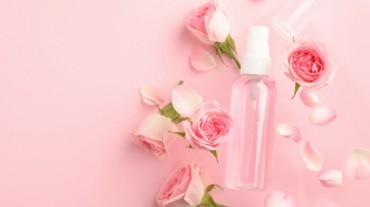
Combat skin dryness by using rose water and glycerine. Know the benefits of using rose water and glycerine for skin and ways to include this combination in your winter skin care routine.
Skin dryness is quite common during winter. While applying a moisturiser is a must, you must try some natural remedies too. Women with dry skin would know that glycerine works wonders. So, using this ingredient is a must, especially when chilly winds sweep in. For more benefits, you can mix rose water with glycerine. Read on to find out more about using rose water and glycerine for healthy skin in winter.
What is rose water?
Rose water is exactly what it sounds! It is a fragrant liquid that is distilled from fresh rose petals, says beauty veteran Dr Blossom Kochhar.

Here are some benefits of rose water for skin:
1. Soothes skin irritation
Rose water can help to soothe skin irritation. Due to its anti-inflammatory properties, it calms the skin and helps in managing skin conditions, including eczema.
Also Read

2. Natural cleanser
Rose water works like a natural cleanser. It gently removes dirt and grime, as well as any excess oil that gets built up on your skin.
3. Hydrator
Rose water is an excellent hydrator, as it helps in moisturising the skin. It nourishes the layers of skin from within, says the expert.
4. Reduces cell damage
If you are someone who is dealing with fine lines and wrinkles, don’t worry. The antioxidants present in rose water helps in reducing cell damage.
Select Topics of your interest and let us customize your feed.
PERSONALISE NOW
5. Reduces eye puffiness
Applying rose water under the eyes helps to reduce puffiness. Rosewater contains vitamin C which helps to brighten the under eye area.
What is glycerine?
Glycerine or glycerol is a type of moisturising agent, which can be used to get rid of chapped lips, dry hands and cracked heels. Using glycerine can help to improve the skin’s moisture levels. It attracts moisture from the environment and traps in your skin to make it appear healthy and soft, explains Dr Kochhar. As per a 2008 research published in the British Journal of Dermatology, glycerol not only plays a role in skin hydration, but also cutaneous elasticity and skin barrier repair.
Here are some more benefits:
1. Protects skin against pollutants
Glycerine can help to protect skin against irritants and pollutants. It also helps in increasing cell turnover that plays a pivotal role in the healing of wounds.

2. Removes dead skin cells
Glycerine helps to remove dead skin cells from the skin by breaking down the proteins in them. This way it helps in new cell generation, so you end up getting clear and healthy skin.
How to use rose water and glycerine for dry skin?
The combination of rose water and glycerine works amazingly well for your face. Here are some ways to use rose water and glycerine for skin:
1. Face mist
Mix rose water and glycerine well and put it in a spray bottle. It is one of the best face mists that you can have, says the expert.
2. Facial mask
Mix these two ingredients with honey in a bowl. Take a cotton sheet mask and dip it in the mixture. Apply the mask on your face and leave it for 20 minutes.
3. Moisturiser
Mix rose water with glycerin, distilled water, sweet almond oil, rose essential oil and argan oil to make a moisturiser. It can help your skin to stay hydrated and improve the quality of your skin.
What are the side effects of using rose water and glycerine together?
Using rose water and glycerine is good due to their soothing and hydrating qualities. But there are always some considerations.
• Some people may be allergic to rose water or glycerine. These allergies may manifest as redness, rash or swelling. It is recommended to apply a little bit of this mixture to a small area of your skin.
• While glycerine helps to retain moisture, which is generally considered beneficial, individuals with acne-prone skin may find that the increased moisture can lead to breakouts.
There are generally no complaints when it comes rose water but glycerine, when used in higher concentrations, can sometimes leave a sticky or tacky feeling on the skin. So, adjust the ratio of rose water to glycerine or use just a small amount of glycerine.








